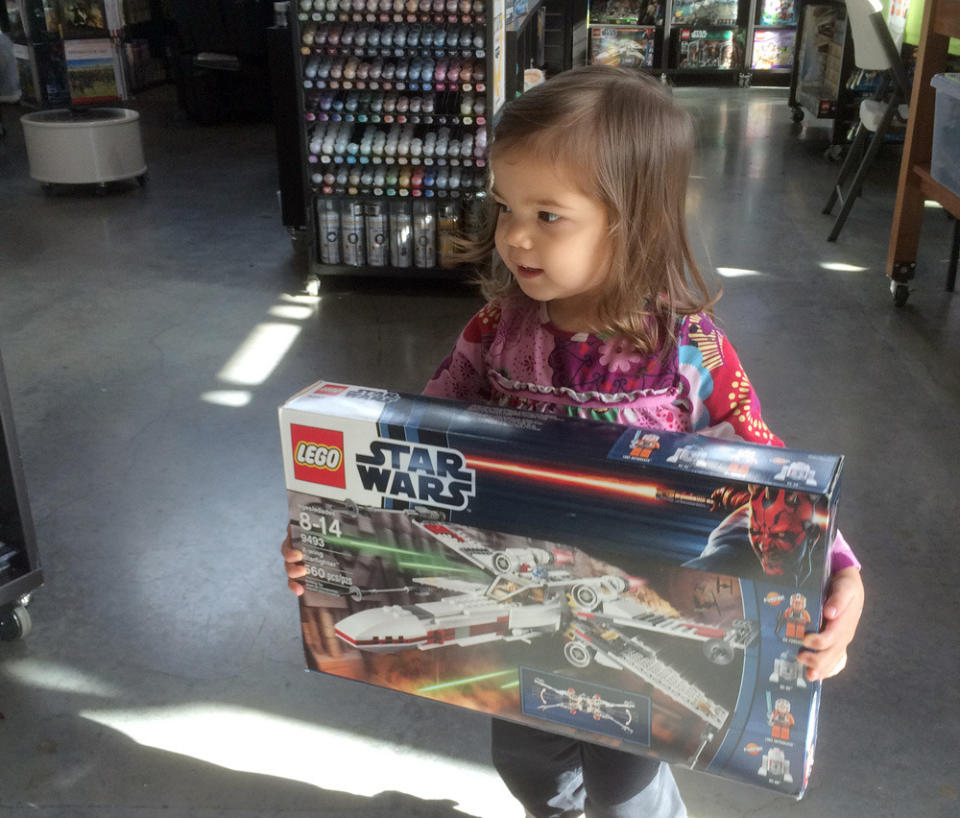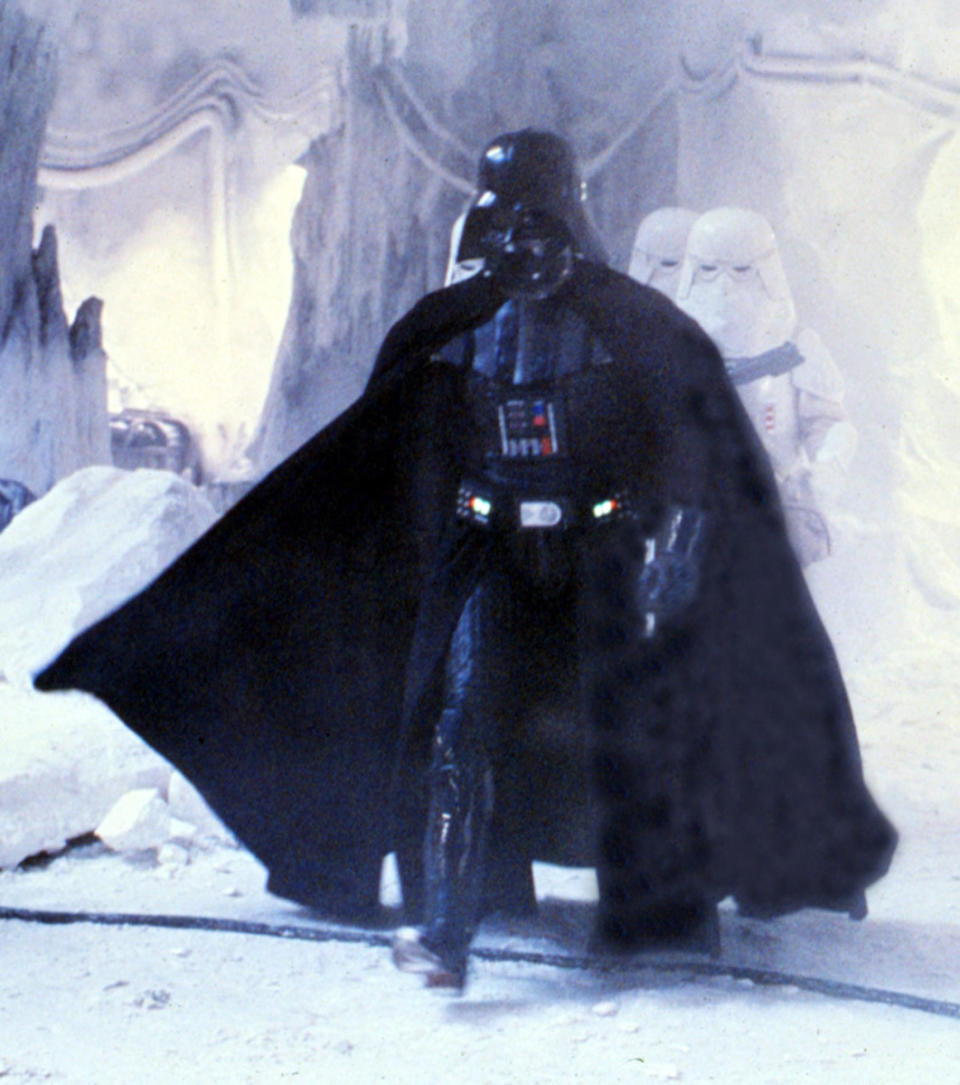Toddler Can’t Get Enough of ‘Star Wars’ ‘Imperial March’
A video of a baby in her crib humming “The Imperial March” from Star Wars is going viral.
Jonathan Liu, an editor at GeekDad, posted the baby-monitor video of his 2-and-a-half year old daughter on YouTube November 6th, and it’s since racked up almost 200,000 views.
“We watched Star Wars with our kids recently, and our toddler really enjoyed the bits she saw before her bedtime,” Liu wrote on Youtube. “One of her favorite parts: the Imperial March. Here she is singing it to herself in her crib.”
I can relate. While listening to a radio show one morning, a snippet of “The Imperial March” came on and my then 3-year-old perked up and said, “Mom, do you know Darth Vader? This is his favorite song!” Turns out her preschool class had listened to the Star Wars score after lots of the kids had talked about the movie. By the time she turned 4, my daughter was begging us to let her see the full series, “especially the battles when they use the light savers!”
VIDEO: The Science of Toddler Temper Tantrums
Star Wars is clearly a cultural touchstone, but there are a lot of dark themes and scary images (like Darth Vader) in the films. So, when is the right time for kids to watch? “Every kid is different,” David Anderson, PhD, a clinical psychologist at the Child Mind Institute, tells Yahoo Parenting. He notes that many families follow official ratings guidelines: G for everyone, PG for elementary-school aged, and PG-13 for 13 and up. “But some parents go into a higher level of detail around ratings,” says Anderson. “They want to know what their children might see beforehand and avoid certain moments of violence or sexual content.”
Liu wrote a blog post in 2012 which he talked about how his older daughters, then 8 and 5, hadn’t yet seen Star Wars. “I’m sure many of you think this is much too late. … In my defense, my older daughter is a bit timid, who has in the past had nightmares from watching Winnie the Pooh and The Muppet Show (talking furniture — don’t ask), so we tend to wait on things that might freak her out.”
STORY: 6-Year-Old’s Hilarious Math Answer Shows He’s ‘Going Places’
Anderson says that type of mindful parenting is smart. “I love so many things about what this family did,” he says. The parents considered their kids’ personalities and introduced the movies at the right time. The older girls are now 8 and 11, and over a long weekend this fall, they finally sat down to watch the series as a family.

Liu’s youngest daughter loves her Star Wars. (Photo: Jonathan Liu)
Liu’s toddler had seen parts of the movie before she went to bed. “It’s not clear how much she really understood what was going on,” Liu wrote, “but she definitely learned to recognize some of the characters, like R2-D2 and Creepio and Yoda.”
And, obviously, Darth Vader. “When he first appeared on the screen, she started mimicking the sound of his breathing,” Liu blogged. “When ‘The Imperial March’ started playing, she stood up and danced!”

(Photo: LucasFilms/Courtesy of Everett Collection)
Adorable videos aside, could this family be exposing their youngest daughter to too much too soon? “In general, 2 ½ is young for Star Wars, but she caught pieces of it and was singing a song — that’s not a big issue,” says Anderson.
In 2012, a Portland, Ore., father named Scott Hanselman wrote a post called “The Nerd Parent’s Guide: When and how to introduce your kids to Star Wars.” In it, he talks about showing the films to his 4- and 6-year-old sons, and recommends viewing the movies in “machete order” with kids in small 20-minute segments, taking breaks to talk about what’s going on in the films — the characters, the storyline. “Make the films an event with crafts and discussion of mythology rather than just dumping it on their little brains,” he writes.
Anderson agrees that it’s a wise way to introduce Star Wars to kids. “That’s mediated viewing,” he says. “It’s a term that’s drawn from research around kids and consumption of media, and it results in better outcomes and better processing and better emotional coping if they’re able to discuss what they’re seeing with their parents.”
Of course, in the movie theaters this December, mediated viewing isn’t an option. And, at least for the first weekend, there will be no website that parents can consult about the content of Star Wars: The Force Awakens. Anderson recommends talking to friends and family who see the movie first — what kinds of scenes and themes might children react to? “Prepare kids for what they’ll see by talking beforehand,” says Anderson. “And let them know that you’re open to questions and discussion afterwards.”
Please follow @YahooParenting on Facebook, Twitter, Instagram, and Pinterest. Have an interesting story to share about your family? Email us at YParenting (at) Yahoo.com.

